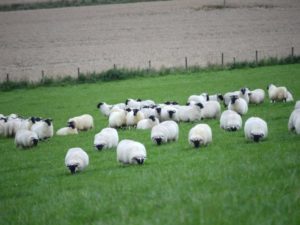“Iceberg” disease threat
20 August 2016 Veterinarian and researcher Fiona Lovatt delivered a wake up call to the sheep industry at BSAS 2016. From a survey of over 800 UK farms who were finishing lambs and selling on average 670 lambs a year, 94% of farmers claimed to have never seen the five “iceberg” diseases, she concluded they were in denial. Irrefutable evidence collected from fallen stock centres show the true extent of these iceberg diseases – so called because there are very few diagnosed cases (tip of the iceberg) but in fact there are far more infected animals than farmers or their vets recognise.
Veterinarian and researcher Fiona Lovatt delivered a wake up call to the sheep industry at BSAS 2016. From a survey of over 800 UK farms who were finishing lambs and selling on average 670 lambs a year, 94% of farmers claimed to have never seen the five “iceberg” diseases, she concluded they were in denial. Irrefutable evidence collected from fallen stock centres show the true extent of these iceberg diseases – so called because there are very few diagnosed cases (tip of the iceberg) but in fact there are far more infected animals than farmers or their vets recognise.
Maedi Visna (MV)
2.8% of farms tested positive using blood samples. Up to 15% in Gloucestershire.
Ovine Johne’s Disease (OJD)
6% of fallen stock diagnosed
Jaagsiekte (OPA)
6% of fallen stock diagnosed
Caseous lymphadenitis (CLA)
18% of terminal flocks had this problem in a survey in 2000
Border Disease (BD)
Sheep version of BVD reasonably rare
These diseases are increasing in prevalence. An estimated 37,000 ewes in the UK were estimated to have Maedi Visna in 1995 in commercial flocks. This had risen to 109,000 by 2011.
Part of the problem is the UK stratified breeding system with draft ewes and cross bred ewes being widely sold as replacements to farmers, who also buy in rams. Anyone breeding sheep for sale and admitting to having any of these diseases is committing commercial suicide, so they keep their mouths shut and hope for the best. This is not working. .
- Find out what diseases are on your farm, without this information you can’t make sensible quarantine decisions. Test blood for OJD and CLA bearing in mind tests are not perfect and false negatives may occur. Tests for BD and MV are more accurate.
- Talk these results over with your vet and make plans to control the problems. Some vaccines are available, for example CLA.
- Fiona’s best advice was for commercial farmers to test their 12 thinnest ewes.
- Unfortunately until buyers of replacement stock start demanding that they are buying non infected stock these problems will grow and threaten the viability of the sheep industry.
John Vipond
Sign up to the FAS newsletter
Receive updates on news, events and publications from Scotland’s Farm Advisory Service
